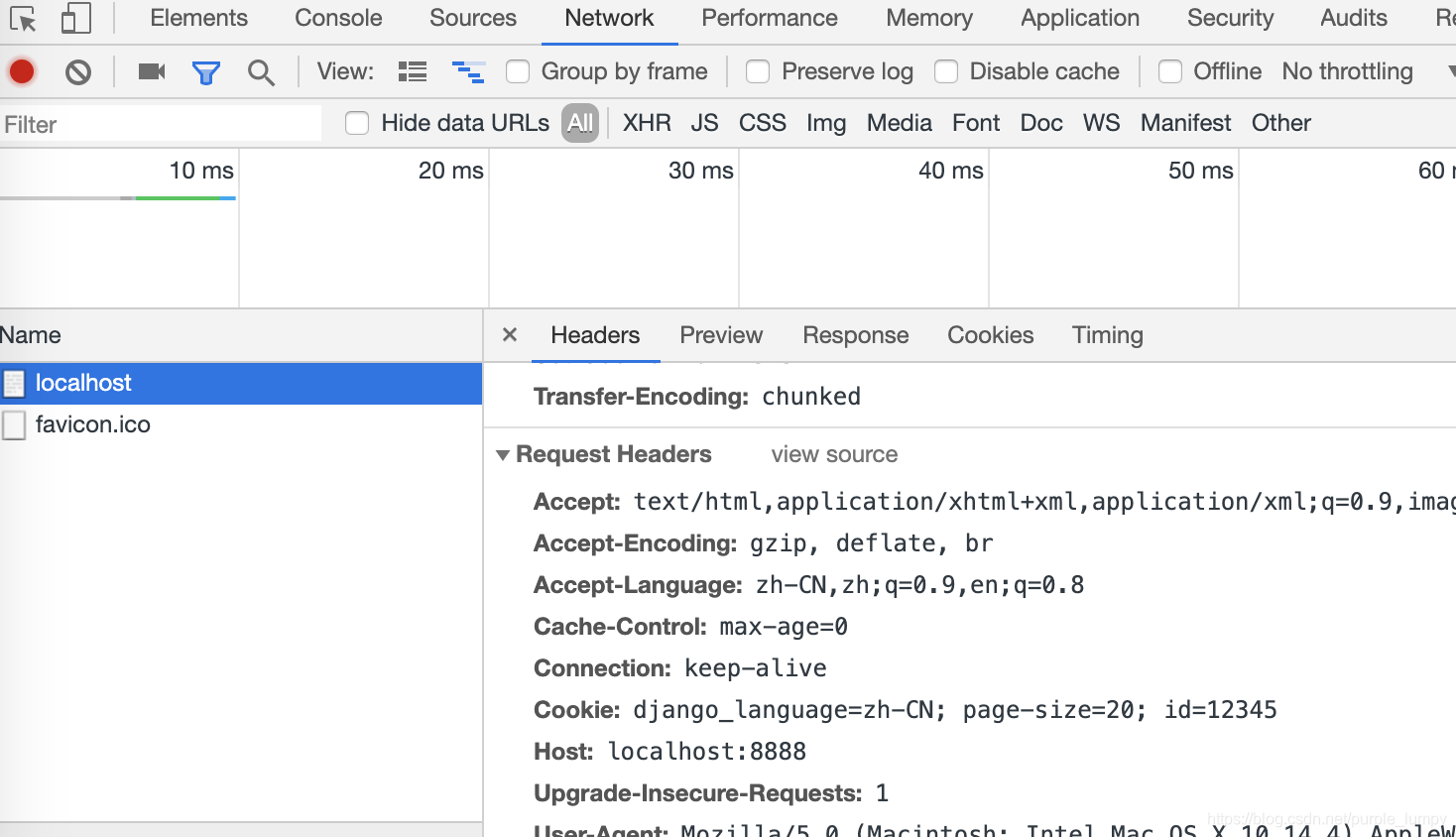cookie
Cookie 是服务端返回数据的时候,通过 Set-Cookie 这个 header,设置到浏览器中,并保存在浏览器中的内容。
浏览器保存了这个Cookie 后,下次在同域的请求中,就会带上这个Cookie。
Cookie 是键值对的形式保存的,可以设置多个。
cookie 属性
max-age 和 expires 设置过期时间
Secure 只在 https 的时候发送
设置了 HttpOnly 后,就无法通过 js 的document.cookie 去访问了(安全性)
下面我们来实验一下cookie 的使用。
首先是server.js 如下
const http = require('http')
const fs = require('fs')
http.createServer(function (request, response) {
console.log('request come', request.url)
if (request.url === '/') {
const html = fs.readFileSync('test.html', 'utf8')
response.writeHead(200, {
'Content-Type': 'text/html',
'Set-Cookie': 'id=12345'
})
response.end(html)
}
}).listen(8888)
console.log('serve listening on 8888')
然后是test.html
<html lang="en">
<head>
<meta charset="UTF-8">
<meta name="viewport" content="width=device-width, initial-scale=1.0">
<meta http-equiv="X-UA-Compatible" content="ie=edge">
<title>MyHtml</title>
</head>
<body>
<div>hello world</div>
<div>don't speak</div>
<script>
console.log(document.cookie)
</script>
</body>
</html>
然后,我们启动服务。在浏览器中打开页面localhost:8888 ,就可以看到:

当我们再次刷新页面时,会看到相同的网络请求,Request Header 中包含了Cookie了:

传多个Cookie,在node.js 中是通过在Set-Cookie中传递数组的方式传递多个Cookie 的,如下。
const http = require('http')
const fs = require('fs')
http.createServer(function (request, response) {
console.log('request come', request.url)
if (request.url === '/') {
const html = fs.readFileSync('test.html', 'utf8')
response.writeHead(200, {
'Content-Type': 'text/html',
'Set-Cookie': ['id=12345', 'abc=456']
})
response.end(html)
}
}).listen(8888)
console.log('serve listening on 8888')
Cookie 的时效
Cookie 是有时效的。如果我们没有设置它的时间,它就是在我们关闭浏览器之后就不可用了。
当然,我们也可以为cookie 设置过期时间。如下(max-age 单位为秒)。
const http = require('http')
const fs = require('fs')
http.createServer(function (request, response) {
console.log('request come', request.url)
if (request.url === '/') {
const html = fs.readFileSync('test.html', 'utf8')
response.writeHead(200, {
'Content-Type': 'text/html',
'Set-Cookie': ['id=12345; max-age=2', 'abc=456']
})
response.end(html)
}
}).listen(8888)
console.log('serve listening on 8888')
max-age 是通过设置时长计算过期时间,而expires 是指定在某个时间点后过期(比较麻烦)。
HttpOnly 属性
我们可以为cookie设置HttpOnly 属性,如下。
const http = require('http')
const fs = require('fs')
http.createServer(function (request, response) {
console.log('request come', request.url)
if (request.url === '/') {
const html = fs.readFileSync('test.html', 'utf8')
response.writeHead(200, {
'Content-Type': 'text/html',
'Set-Cookie': ['id=12345; max-age=2', 'abc=456; HttpOnly']
})
response.end(html)
}
}).listen(8888)
console.log('serve listening on 8888')
这时候 console就不会打印出abc=456 这个cookie 。
domain
当我们设置了某个url 如 a.com有一个cookie,那么怎样使得 b.a.com 也可以使用这个cookie 呢?就是通过domain。
如下,当然我们可能还要使用chrome 插件,hostAdmin 将test.com 重定向为localhost
const http = require('http')
const fs = require('fs')
http.createServer(function (request, response) {
console.log('request come', request.url)
const host = request.headers.host;
if (request.url === '/') {
const html = fs.readFileSync('test.html', 'utf8')
if (host === 'test.com') {
response.writeHead(200, {
'Content-Type': 'text/html',
'Set-Cookie': ['id=12345; max-age=2', 'abc=456; HttpOnly', 'ddd=000; domain=test.com']
})
response.end(html)
}
}
}).listen(8888)
console.log('serve listening on 8888')





 本文介绍了Cookie的原理,它是服务端通过Set - Cookie header设置到浏览器并保存的内容,下次同域请求会带上。还阐述了Cookie的属性,如设置过期时间、Secure、HttpOnly等,通过实验展示了其使用方法,包括多Cookie传递、设置时效、domain等。
本文介绍了Cookie的原理,它是服务端通过Set - Cookie header设置到浏览器并保存的内容,下次同域请求会带上。还阐述了Cookie的属性,如设置过期时间、Secure、HttpOnly等,通过实验展示了其使用方法,包括多Cookie传递、设置时效、domain等。
















 1万+
1万+

 被折叠的 条评论
为什么被折叠?
被折叠的 条评论
为什么被折叠?








